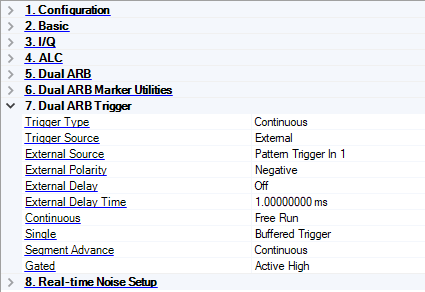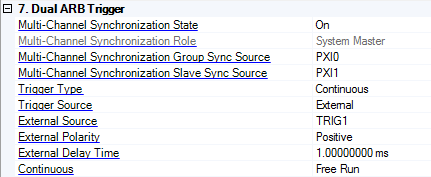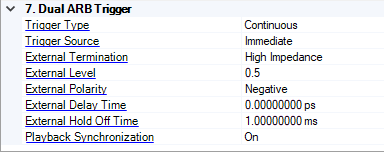



(M9381A only)
Choice: On | Off
Default: Off
Double-click or use the drop-down menu to enable or disable the Multi-Channel Synchronization capability.
(M9381A only)
Choice: SystemMaster | GroupMaster | Slave
Indicates how the channel will participate within a multichannel system. This is a read-only parameter.
(M9381A only)
Choice: PXI0 | PXI1 | PXI2 | PXI3 | PXI4 | PXI5 | PXI6 | PXI7
Default: PXI0
Select the PXI backplane trigger line that will be shared by all modules in a PXI chassis that form a synchronization group.
(M9381A only)
Choice: PXI0 | PXI1 | PXI2 | PXI3 | PXI4 | PXI5 | PXI6 | PXI7
Select the PXI backplane trigger line that the slave channel will use for synchronization handshaking.
Choice: Continuous | Single | Gated | Segment Advance
Default: Continuous
Double-click or use the drop-down menu to select the triggering mode.
Continuous – selects the continuous triggering mode, which enables the signal generator to repeat the modulating signal indefinitely until you turn off the modulation format, change triggers, or select another waveform.
Single – sets up a waveform to play once after receiving a trigger.
Gated – sets the signal generator to the gated trigger mode, which causes the waveform (modulating signal) to repeatedly start and stop in response to an externally applied trigger signal. To use the gated trigger mode, you must select External as the Trigger Source.
Segment Advance – controls the way the signal generator plays segments within a sequence. This includes determining whether a segment plays once or continuously, and when the sequence advances to the next segment. See Segment Advance.
(M9383B/M9384B
Choice: Continuous | Single
Default: Continuous
Double-click or use the drop-down menu to select the triggering mode.
Continuous – selects the continuous triggering mode, which enables the signal generator to repeat the modulating signal indefinitely until you turn off the modulation format, change triggers, or select another waveform.
Single – sets up a waveform to play once after receiving a trigger.
Choice: Trigger Key | External | Bus
Default: External
Adjusts the trigger source applied to the PATT TRIG IN or AUX I/O connectors.
Trigger Key – selects the front panel hardkey as the trigger source. After making this selection, press the Trigger hardkey to trigger a waveform.
External – enables you to trigger a waveform with an externally supplied trigger signal.
Bus – enables you to trigger a waveform by sending a command through the GPIB, LAN, or AUXILIARY IO (RS-232) input connector.
(M9383B/M9384B
Choice: Trigger Key | External | Bus | Immediate
Default: External
Adjusts the trigger source applied to the PATT TRIG IN or AUX I/O connectors.
Trigger Key − selects the front panel hardkey as the trigger source. After making this selection, press the Trigger hardkey to trigger a waveform.
External − enables you to trigger a waveform with an externally supplied trigger signal.
Immediate − enables immediate triggering of the waveform playing.
Bus − enables you to trigger a waveform by sending a command through the GPIB, LAN, or AUXILIARY IO (RS-232) input connector.
(M9383B/M9384B
Choice: 50 Ohm | High Impedance
Default: High Impedance
Select the way the trigger line is terminated in the hardware.
(M9383B/M9384B
Range: -3.5 to 3.5
Default: 0.5
Specifies the threshold level in volts at which the trigger transitions states.
Choice:
Pattern Trigger In 1 | Pattern Trigger In 2
M9381A: TRIG1 | PXI0 | PXI1 | PXI2 | PXI3 | PXI4 | PXI5 | PXI6 | PXI7
Default:
Pattern Trigger In 1
M9381A: PXI0
Selects the rear-panel connector for the external trigger source. This parameter is enabled only if external triggering is selected as the trigger source..
Pattern Trigger In 1 – selects the PATTERN TRIG IN rear-panel BNC connector
Pattern Trigger In 2 – selects the PATTERN TRIG IN 2 (AUXILIARY I/O) rear panel connector
For the M9381A PXIe VSG, double-click or use the drop-down menu to select the front-panel input for the external trigger signal. External must be selected as the trigger source.
TRIG1 – selects the Trig 1 front-panel SMA connector as the external trigger input for the M9381A PXIe VSG
PXI0-PXI7 – selects the backplane bus signal for the M9381A PXIe VSG
Choice: Positive | Negative
Default: Negative
Sets the polarity of the external trigger. This parameter is active only if you select external (Ext) as the trigger source.
Positive – the signal generator triggers an event when it detects a rising edge on the PAT TRIG IN signal.
Negative – the signal generator triggers an event when it detects a falling edge on the PAT TRIG IN signal.
Choice: On | Off
Default: Off
Turns the external trigger delay off or on. This parameter is active only after selecting External as the trigger source.
Range:
N5172B/N5182B/N5166B: 5 ns to 41 sec, in 5 ns steps
N5182A: 8 ns to 30 s, in 8 ns steps
All other models: 10 ns to 40 s, in 10 ns steps
Default: 1 ms
Default (M9383B/M9384B
Sets a delay time between when an external trigger is received and when it is applied to the waveform.
Sets the amount of time to delay the signal generator's response to an external trigger, in 8 ns or 10 ns steps. The delay is a path (time) delay between the time the signal generator receives the trigger and when it responds to the trigger.
(M9383B/M9384B
Range: 4 ns to 10 s
Default: 1 ms
Sets the amount of time in seconds to hold off until the next trigger.
(M9383B/M9384B
Choice: On | Off
Default: On
Turns the Playback Synchronization off or on.
Only applied when Trigger Source is set to External and Trigger Type is set to Continuous.
Choice: Free Run | Trigger & Run | Reset & Run
Default: Free Run
Double-click or use the drop-down menu to select the continuous mode and one of the following trigger responses.
Free Run – immediately triggers when you turn the format on.
Trigger & Run – waits for and starts on the first trigger; ignores subsequent triggers.
Reset & Run – waits for and starts on the first trigger; resets and plays on a subsequent trigger.
(M9381A only)
Choice: On | Off
Default: On
Enable or disable a trigger pulse generation after waveform downloading finished.
Choice: Buffered Trigger | No Retrigger | Restart on Trigger
Default: Buffered Trigger
Double-click or use the drop-down menu to select the single mode and one of the following trigger responses.
No Retrigger – the waveform segment ignores triggers during playback
Buffered Trigger – causes a waveform to accept a trigger during playback and to restart after the current play finishes.
Restart on Trigger – causes a waveform to accept a trigger during playback and to restart immediately after receiving a trigger.
Choice: Single | Continuous
Default: Continuous
Double-click or use the drop-down menu to select the segment advance mode and one of the following trigger responses.
Single – causes a segment to play once and to wait for a trigger before the sequence advances to the next segment.
Continuous – causes a segment to play continuously until receiving another trigger. Upon receiving the trigger, the sequence advances to the next segment, which then plays continuously.
Choice: Active High | Active Low
Default: Active High
Double-click or use the drop-down menu to select the gated mode and one of the following trigger responses. To use the gated trigger mode, you must also select External.
Active Low – causes waveform playback to start when the trigger signal goes low and to stop when the trigger signal goes high.
Active High – causes waveform playback to start when the trigger signal goes high and to stop when the trigger signal goes low.